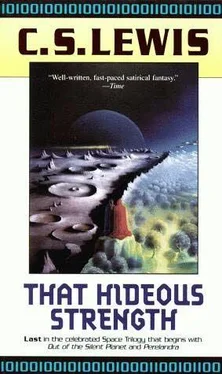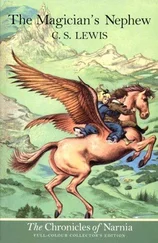Clive Lewis - That Hideous Strength
Здесь есть возможность читать онлайн «Clive Lewis - That Hideous Strength» — ознакомительный отрывок электронной книги совершенно бесплатно, а после прочтения отрывка купить полную версию. В некоторых случаях можно слушать аудио, скачать через торрент в формате fb2 и присутствует краткое содержание. Жанр: Религиоведение, Фэнтези, на английском языке. Описание произведения, (предисловие) а так же отзывы посетителей доступны на портале библиотеки ЛибКат.
- Название:That Hideous Strength
- Автор:
- Жанр:
- Год:неизвестен
- ISBN:нет данных
- Рейтинг книги:5 / 5. Голосов: 1
-
Избранное:Добавить в избранное
- Отзывы:
-
Ваша оценка:
- 100
- 1
- 2
- 3
- 4
- 5
That Hideous Strength: краткое содержание, описание и аннотация
Предлагаем к чтению аннотацию, описание, краткое содержание или предисловие (зависит от того, что написал сам автор книги «That Hideous Strength»). Если вы не нашли необходимую информацию о книге — напишите в комментариях, мы постараемся отыскать её.
That Hideous Strength — читать онлайн ознакомительный отрывок
Ниже представлен текст книги, разбитый по страницам. Система сохранения места последней прочитанной страницы, позволяет с удобством читать онлайн бесплатно книгу «That Hideous Strength», без необходимости каждый раз заново искать на чём Вы остановились. Поставьте закладку, и сможете в любой момент перейти на страницу, на которой закончили чтение.
Интервал:
Закладка:
Mark, who had never seen Curry baited before, was beginning to enjoy himself.
“I see,” said Feverstone. “In order to keep the place going as a learned society, all the best brains in it have to give up doing anything about learning.”
“Exactly!” said Curry. “That’s just-” and then stopped, uncertain whether he was being taken quite seriously. Feverstone burst into laughter. The Bursar, who had up till now been busily engaged in eating, wiped his beard carefully and spoke.
“All that’s very well in theory,” he said, “but I think Curry’s quite right. Supposing he resigned his office as sub-warden and retired into his cave. He might give us a thundering good book on economics.”
“Economics?” said Feverstone, lifting his eyebrows.
“I happen to be a military historian, James,” said Curry. He was often somewhat annoyed at the difficulty which his colleagues seemed to find in remembering what particular branch of learning he had been elected to pursue.
“I mean military history, of course,” said Busby.
“As I say, he might give us a thundering good book on military history. But it would be superseded in twenty years. Whereas the work he is actually doing for the College will benefit it for centuries. This whole business, now, of bringing the N.I.C.E. to Edgestow. What about a thing like that, Feverstone? I’m not speaking merely of the financial side of it, though as Bursar I naturally rate that pretty high. But think of the new life, the awakening of new vision, the stirring of dormant impulses. What would any book on economics . . .”
“Military history,” said Feverstone gently, but this time Busby did not hear him.
“What would any book on economics be, compared with a thing like that?” he continued. “I look upon it as the greatest triumph of practical idealism that this century has yet seen.”
The good wine was beginning to do its good office. We have all known the kind of clergyman who tends to forget his clerical collar after the third glass: but Busby’s habit was the reverse. It was after the third glass that he began to remember his collar. As wine and candlelight loosened his tongue, the parson still latent within him after thirty years’ apostasy began to wake into a strange galvanic life.
“As you chaps know,” he said, “I make no claim to orthodoxy. But if religion is understood in the deepest sense, I have no hesitation in saying that Curry, by bringing the N.I.C.E. to Edgestow, has done more for it in one year than Jewel has done in his whole life.”
“Well,” said Curry modestly, “that’s rather the sort of thing one had hoped. I mightn’t put it exactly as you do, James.”
“No, no,” said the Bursar. “Of course not. We all have our different languages; but we all really mean the same thing.”
“Has anyone discovered,” asked Feverstone, “what, precisely, the N.I.C.E. is, or what it intends to do?” Curry looked at him with a slightly startled expression.
“That comes oddly from you, Dick,” he said. “I thought you were in on it yourself.”
“Isn’t it a little naive,” said Feverstone, “to suppose that being in on a thing involves any distinct knowledge of its official programme?”
“Oh well, if you mean details,” said Curry, and then stopped.
“Surely, Feverstone,” said Busby, “you’re making a great mystery about nothing. I should have thought the objects of the N.I.C.E. were pretty clear. It’s the first attempt to take applied science seriously from the national point of view. The difference in scale between it and anything we’ve had before amounts to a difference in kind. The buildings alone, the apparatus alone!-think what it has done already for industry. Think how it is going to mobilise all the talent of the country: and not only scientific talent in the narrower sense. Fifteen departmental directors at fifteen thousand a year each! Its own legal staff! Its own police, I’m told! Its own permanent staff of architects, surveyors, engineers! The thing’s stupendous!”
“Careers for our sons,” said Feverstone. “I see.”
“What do you mean by that, Lord Feverstone?” said Busby, putting down his glass.
“God!” said Feverstone, his eyes laughing. “What a brick to drop. I’d quite forgotten you had a family, James.”
“I agree with James,” said Curry, who had been waiting somewhat impatiently to speak. “The N.I.C.E. marks the beginning of a new era-the really scientific era. Up to now everything has been haphazard. This is going to put science itself on a scientific basis. There are to be forty interlocking committees sitting every day and they’ve got a wonderful gadget-I was shown the model last time I was in town-by which the findings of each committee print themselves off in their own little compartment on the Analytical Notice-Board every half hour. Then that report slides itself into the right position where it’s connected up by little arrows with all the relevant parts of the other reports. A glance at the board shows you the policy of the whole Institute actually taking shape under your own eyes. There’ll be a staff of at least twenty experts at the top of the building working this notice-board in a room rather like the Tube control rooms. It’s a marvellous gadget. The different kinds of business all come out in the board in different coloured lights. It must have cost half a million. They call it a Pragmatometer.”
“And there,” said Busby, “you see again what the Institute is already doing for the country. Pragmatometry is going to be a big thing. Hundreds of people are going in for it. Why, this Analytical Notice-Board will probably be out of date before the building is finished!”
“Yes, by Jove,” said Feverstone, “and N.O. himself told me this morning that the sanitation of the Institute was going to be something quite out of the ordinary.”
“So it is,” said Busby sturdily. “I don’t see why one should think that unimportant.”
“And what do you think about it, Studdock?” said Feverstone.
“I think,” said Mark, “that James touched on the most important point when he said that it would have its own legal staff and its own police. I don’t give a fig for Pragmatometers and sanitation de luxe. The real thing is that this time we’re going to get science applied to social problems and backed by the whole force of the state, just as war has been backed by the whole force of the state in the past. One hopes, of course, that it’ll find out more than the old free-lance science did: but what’s certain is that it can do more.”
“Damn,” said Curry, looking at his watch. “I’ll have to go and talk to N.O. now. If you people would like any brandy when you’ve finished your wine, it’s in that cupboard. You’ll find balloon glasses on the shelf above. I’ll be back as soon as I can. You’re not going, James, are you?”
“Yes,” said the Bursar. “I’m going to bed early. Don’t let me break up the party for you two. I’ve been on my legs nearly all day, you know. A man’s a fool to hold any office in this College. Continual anxiety. Crushing responsibility. And then you get people suggesting that all the little research-beetles who never poke their noses outside their libraries and laboratories are the real workers! I’d like to see Glossop or any of that lot face the sort of day’s work I’ve had to-day. Curry, my lad, you’d have had an easier life if you’d stuck to economics.”
“I’ve told you before-” began Curry, but the Bursar, now risen, was bending over Lord Feverstone and telling him a funny story.
As soon as the two men had got out of the room Lord Feverstone looked steadily at Mark for some seconds with an enigmatic expression. Then he chuckled. Then the chuckle developed into a laugh. He threw his lean, muscular body well back into his chair and laughed louder and louder. He was very infectious in his laughter and Mark found himself laughing too-quite sincerely and even helplessly, like a child. “Pragmatometers-palatial lavatories-practical idealism,” gasped Feverstone. It was a moment of extraordinary liberation for Mark. All sorts of things about Curry and Busby which he had not previously noticed, or else, noticing, had slurred over in his reverence for the Progressive Element, came back to his mind. He wondered how he could have been so blind to the funny side of them.
Читать дальшеИнтервал:
Закладка:
Похожие книги на «That Hideous Strength»
Представляем Вашему вниманию похожие книги на «That Hideous Strength» списком для выбора. Мы отобрали схожую по названию и смыслу литературу в надежде предоставить читателям больше вариантов отыскать новые, интересные, ещё непрочитанные произведения.
Обсуждение, отзывы о книге «That Hideous Strength» и просто собственные мнения читателей. Оставьте ваши комментарии, напишите, что Вы думаете о произведении, его смысле или главных героях. Укажите что конкретно понравилось, а что нет, и почему Вы так считаете.












